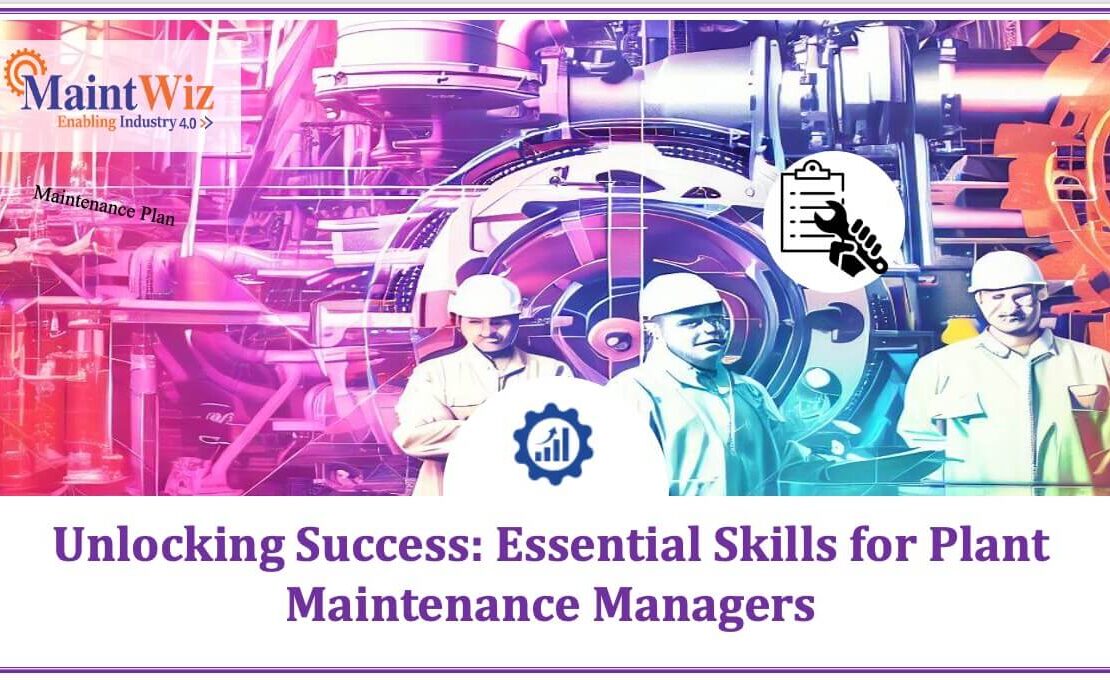
Effective plant maintenance management is crucial for the success of any manufacturing enterprise. Plant maintenance managers play a vital role in ensuring the reliability, availability, and performance of critical equipment and systems. To excel in this role, professionals need a diverse set of skills that encompass technical expertise, leadership abilities, and effective communication. In this article, we will explore the essential skills required for plant maintenance managers and how they contribute to unlocking success in plant maintenance management.
Table of Contents
Overview: Importance of Skills in Plant Maintenance Management
Technical Competence
Technical competence forms the foundation of effective plant maintenance management. Plant maintenance managers must have a deep understanding of the equipment and systems they oversee. They should possess comprehensive knowledge of maintenance techniques, troubleshooting methods, and industry best practices. By staying updated with the latest advancements and technologies, maintenance managers can ensure optimal equipment performance and reduce downtime.
Problem-Solving Skills
Problem-solving skills are crucial for plant maintenance managers to identify and resolve issues efficiently. They should be adept at analyzing complex problems, conducting root cause analysis, and implementing effective solutions. By utilizing analytical thinking and troubleshooting abilities, maintenance managers can minimize equipment failures, optimize maintenance strategies, and enhance overall operational efficiency.
Leadership and Communication Abilities
Strong leadership and communication abilities are essential for plant maintenance managers to effectively coordinate teams and collaborate with stakeholders. They should possess the skills to inspire and motivate their team members, delegate responsibilities, and foster a culture of continuous improvement. Effective communication ensures clear conveyance of goals, expectations, and feedback, leading to increased productivity and successful outcomes.
Adaptability and Flexibility
In the dynamic manufacturing environment, adaptability and flexibility are critical for plant maintenance managers. They must be able to handle changing priorities, manage multiple tasks, and meet deadlines without compromising quality. By embracing change and adjusting maintenance strategies accordingly, maintenance managers can ensure operational excellence and drive continuous improvement.
Technical Skills for Plant Maintenance Managers
Plant maintenance managers need to possess a wide range of technical skills, including equipment maintenance and troubleshooting, preventive-maintenance and predictive maintenance techniques, data analysis and interpretation, and leadership and management abilities. By combining technical expertise with leadership qualities, maintenance managers can optimize maintenance processes and drive superior outcomes.
Equipment Maintenance and Troubleshooting
Preventive and Predictive Maintenance Techniques
Implementing preventive and predictive maintenance techniques is vital for plant maintenance managers to proactively address equipment issues. By conducting regular inspections, implementing maintenance schedules, and utilizing condition monitoring tools, maintenance managers can detect potential failures in advance and take corrective actions to prevent costly downtime.
Root Cause Analysis
Root cause analysis is a systematic approach used by plant maintenance managers to identify the underlying causes of equipment failures. By analyzing data, investigating incidents, and applying problem-solving methodologies, maintenance managers can uncover the root causes of issues and implement targeted solutions to eliminate recurring problems.
Data Analysis and Interpretation
Data analysis plays a significant role in plant maintenance management. Maintenance managers need to be proficient in interpreting data gathered from various sources such as sensors, maintenance records, and performance indicators. By leveraging data analytics tools and techniques, maintenance managers can gain valuable insights, identify trends, and make informed decisions to optimize maintenance strategies.
Leadership and Management Skills
Effective leadership and management skills are essential for plant maintenance managers to drive successful maintenance programs. They should be capable of building and leading high-performing maintenance teams, setting clear goals, and managing resources efficiently. By fostering a culture of collaboration and continuous improvement, maintenance managers can enhance team productivity and achieve maintenance excellence.
Team Building and Collaboration
Effective Communication and Interpersonal Skills
Effective communication and interpersonal skills are crucial for plant maintenance managers to build strong relationships with team members and stakeholders. They should be able to convey information clearly, actively listen to others, and foster open lines of communication. By promoting a collaborative work environment, maintenance managers can enhance teamwork, resolve conflicts, and improve overall productivity.
Decision-Making and Problem-Solving
Decisive decision-making and problem-solving skills are vital for plant maintenance managers to address challenges effectively. They should be able to analyze complex situations, evaluate alternatives, and make informed decisions that align with organizational goals. By combining critical thinking with problem-solving methodologies, maintenance managers can overcome obstacles and achieve optimal maintenance outcomes.
Change Management
Change is inevitable in the manufacturing industry, and plant maintenance managers must be adept at managing and adapting to change. They should possess the skills to communicate changes, address concerns, and guide their team through transitions. By fostering a culture of continuous learning and adaptability, maintenance managers can embrace change and drive successful maintenance transformations.
Planning and Organizational Skills
Effective planning and organizational skills are essential for plant maintenance managers to optimize maintenance activities. They should be able to develop comprehensive maintenance plans, allocate resources efficiently, and schedule tasks to ensure timely completion. By prioritizing work, minimizing downtime, and maximizing equipment availability, maintenance managers can enhance operational efficiency and reduce costs.
Maintenance Planning and Scheduling
Resource Allocation and Management
Plant maintenance managers need to allocate resources effectively to ensure efficient maintenance operations. They should be able to manage manpower, equipment, and materials to meet maintenance demands. By optimizing resource allocation, maintenance managers can enhance productivity, minimize costs, and maximize the lifespan of critical assets.
Budgeting and Cost Control
Budgeting and cost control skills are crucial for plant maintenance managers to manage maintenance expenses effectively. They should be able to develop budgets, track expenditures, and implement cost-saving initiatives without compromising quality. By minimizing unnecessary costs and optimizing maintenance budgets, maintenance managers can contribute to the overall profitability of the organization.
Risk Assessment and Management
Risk assessment and management are integral parts of plant maintenance management. Maintenance managers need to identify potential risks, evaluate their impact, and implement mitigation strategies. By proactively managing risks, maintenance managers can minimize unplanned downtime, ensure employee safety, and protect the organization’s assets.
Continuous Learning and Professional Development
Maintenance managers should embrace a culture of continuous learning and professional development. They should actively pursue certifications, attend training programs, and stay updated with industry best practices. By expanding their knowledge and skills, maintenance managers can stay ahead of industry trends, adopt innovative technologies, and drive sustainable maintenance practices.
Staying Updated with Industry Trends and Technologies
Pursuing Certifications and Training Programs
Maintenance managers should actively pursue relevant certifications and participate in training programs to stay updated with industry standards and best practices. By acquiring certifications such as Certified Maintenance and Reliability Professional (CMRP) or attending workshops on emerging technologies, maintenance managers can enhance their credibility and expertise.
Networking and Knowledge Sharing
Networking and knowledge sharing are essential for maintenance managers to stay updated with industry trends. They should actively participate in professional associations, attend conferences, and engage in online forums to connect with peers and share insights. By networking and collaborating with industry experts, maintenance managers can gain valuable knowledge and discover innovative approaches to maintenance management.
Adopting a Growth Mindset
Maintenance managers should adopt a growth mindset and embrace new technologies and methodologies. They should be open to change, willing to learn, and encourage their teams to explore innovative solutions. By fostering a culture of continuous improvement and embracing emerging technologies, maintenance managers can drive efficiency, effectiveness, and competitiveness in maintenance operations.
Safety and Compliance Skills
Ensuring safety and compliance is of utmost importance in plant maintenance management. Maintenance managers should possess the knowledge of safety regulations, best practices, and compliance requirements. By implementing safety protocols, conducting risk assessments, and maintaining compliance, maintenance managers can create a safe work environment, minimize accidents, and protect the well-being of employees.
Systems and Technology Expertise
CMMS
A Computerized Maintenance Management System (CMMS) is a vital tool for plant maintenance managers. They should have expertise in utilizing CMMS software to streamline maintenance processes, manage work orders, and track asset performance. By leveraging CMMS effectively, maintenance managers can improve maintenance planning, optimize resource allocation, and enhance overall maintenance efficiency.
Operational Technologies
Operational technologies, such as sensors, automation systems, and predictive analytics, play a crucial role in modern maintenance management. Plant maintenance managers should possess the knowledge and skills to leverage these technologies to monitor equipment performance, detect anomalies, and proactively address maintenance needs. By harnessing operational technologies, maintenance managers can minimize unplanned downtime, extend asset lifespan, and improve overall equipment reliability.
Internet of Things
The Internet of Things (IoT) is revolutionizing the manufacturing industry, and plant maintenance managers should have a strong understanding of IoT concepts and applications. They should be able to leverage IoT technologies to collect real-time data, enable remote monitoring, and implement predictive maintenance strategies. By harnessing the power of IoT, maintenance managers can optimize maintenance operations, reduce costs, and enhance equipment performance.
OT-ET Integration
The integration of Operational Technology (OT) and Enterprise Technology (ET) is crucial for effective maintenance management. Plant maintenance managers should possess the skills to integrate OT and ET systems to enable seamless data flow, enhance decision-making, and optimize maintenance processes. By integrating OT-ET systems, maintenance managers can gain a holistic view of their assets, improve asset performance, and drive data-driven maintenance strategies.
Power of Data-Driven Maintenance
Data-driven maintenance is transforming the way maintenance operations are conducted. Plant maintenance managers should be proficient in utilizing data analytics, predictive modeling, and machine learning algorithms to make data-driven decisions. By harnessing the power of data, maintenance managers can optimize maintenance strategies, predict failures, and schedule maintenance activities more effectively.
Emerging Technologies and Their Applications in Maintenance
Maintenance managers should stay updated with emerging technologies such as Artificial Intelligence (AI), Augmented Reality (AR), and Robotics to understand their potential applications in maintenance management. By exploring and adopting emerging technologies, maintenance managers can enhance efficiency, reduce costs, and unlock new possibilities in maintenance operations.
Knowledge of Safety Regulations and Procedures
Implementing Safety Protocols and Best Practices
Maintenance managers should have a comprehensive understanding of safety protocols and best practices. They should implement and enforce safety procedures to ensure a safe working environment for maintenance personnel. By prioritizing safety, maintenance managers can prevent accidents, reduce injuries, and maintain compliance with regulatory standards.
Conducting Risk Assessments and Mitigation Strategies
Maintenance managers should be skilled in conducting risk assessments to identify potential hazards and assess their impact on maintenance operations. They should develop and implement mitigation strategies to minimize risks and ensure the safety of personnel and equipment. By proactively managing risks, maintenance managers can prevent incidents and create a secure work environment.
Ensuring Regulatory Compliance
Compliance with regulatory standards is crucial in plant maintenance management. Maintenance managers should have knowledge of applicable regulations and ensure that maintenance activities align with legal requirements. By maintaining regulatory compliance, maintenance managers can avoid penalties, protect the organization’s reputation, and ensure the well-being of employees.
Problem-Solving and Decision-Making Skills
Effective problem-solving and decision-making skills are essential for plant maintenance managers to address safety-related challenges. They should be capable of analyzing safety incidents, identifying root causes, and implementing corrective actions. By making informed decisions and implementing proactive safety measures, maintenance managers can create a secure work environment and mitigate potential risks.
Analytical Thinking and Troubleshooting Abilities
Prioritizing and Managing Critical Issues
Maintenance managers should possess the ability to prioritize and manage critical issues effectively. They should identify urgent maintenance needs, allocate resources accordingly, and ensure timely resolution. By prioritizing critical issues, maintenance managers can minimize equipment downtime and maintain operational continuity.
Utilizing Data and Information for Informed Decisions
Data and information are valuable assets in maintenance management. Maintenance managers should be skilled in gathering and analyzing data to make informed decisions. By utilizing data-driven insights, maintenance managers can optimize maintenance strategies, identify improvement opportunities, and drive continuous improvement.
Continuous Improvement and Innovation
Continuous improvement and innovation are essential for plant maintenance managers to stay ahead of the competition. They should encourage a culture of continuous improvement, solicit feedback from the team, and implement innovative maintenance practices. By fostering a culture of innovation, maintenance managers can drive efficiency, reduce costs, and enhance overall maintenance effectiveness.
Effective Communication and Interpersonal Skills
Effective communication and interpersonal skills are vital for plant maintenance managers to collaborate with team members, stakeholders, and external partners. They should be able to convey information clearly, listen actively, and build positive relationships. By fostering open communication, maintenance managers can enhance collaboration, resolve conflicts, and achieve maintenance goals effectively.
Communication Skills
Active Listening and Understanding Stakeholder Needs
Active listening is a crucial skill for maintenance managers to understand the needs and expectations of stakeholders. They should listen attentively to feedback, concerns, and suggestions from team members, superiors, and customers. By understanding stakeholder needs, maintenance managers can align maintenance strategies with organizational goals and deliver superior results.
Stakeholder Communications – Updating All Concerned
Effective communication with stakeholders is essential in plant maintenance management. Maintenance managers should provide timely updates to all concerned parties regarding maintenance activities, progress, and any relevant changes. By maintaining transparent and regular communication, maintenance managers can build trust, manage expectations, and ensure smooth coordination among all stakeholders.
Conflict Resolution and Negotiation Skills
Conflict resolution and negotiation skills are valuable for maintenance managers to address conflicts and reach mutually beneficial solutions. They should be able to mediate conflicts, find common ground, and negotiate effectively to achieve win-win outcomes. By resolving conflicts promptly and fostering positive relationships, maintenance managers can maintain a harmonious work environment and enhance productivity.
Building Positive Relationships
Maintenance managers should prioritize building positive relationships with their team members, colleagues, and stakeholders. They should cultivate a supportive and inclusive work environment, recognize and appreciate contributions, and foster teamwork. By building positive relationships, maintenance managers can enhance team morale, encourage collaboration, and achieve shared goals.
Time Management and Prioritization Skills
Time management and prioritization skills are crucial for plant maintenance managers to meet deadlines and optimize resource utilization. They should be able to allocate time effectively, set priorities, and delegate tasks when necessary. By managing time efficiently, maintenance managers can ensure timely completion of maintenance activities and maintain overall operational efficiency.
Managing Multiple Tasks and Deadlines
Setting Priorities and Meeting Goals
Maintenance managers should be skilled in setting priorities and aligning tasks with organizational goals. They should identify critical tasks, set realistic deadlines, and allocate resources accordingly. By setting priorities and meeting goals, maintenance managers can ensure that maintenance activities contribute to overall business objectives.
Delegating Responsibilities Effectively
Delegating responsibilities is essential for maintenance managers to manage multiple tasks efficiently. They should identify team members’ strengths, delegate tasks accordingly, and provide necessary support and guidance. By delegating effectively, maintenance managers can promote skill development, enhance team productivity, and achieve optimal outcomes.
Adapting to Changing Priorities
In a dynamic work environment, maintenance managers should be adaptable and flexible in managing changing priorities. They should be able to reprioritize tasks, adjust schedules, and allocate resources accordingly. By adapting to changing priorities, maintenance managers can ensure the efficient use of resources and maintain operational resilience.
Emotional Intelligence and Leadership Presence
Self-Awareness and Self-Management
Maintenance managers should possess self-awareness and the ability to manage their emotions effectively. They should understand their strengths and weaknesses, handle stress, and maintain a positive attitude. By demonstrating emotional intelligence, maintenance managers can inspire confidence, foster trust, and lead by example.
Empathy and Relationship Building
Empathy and relationship building are critical for maintenance managers to connect with their team members and stakeholders. They should demonstrate empathy, understand others’ perspectives, and build strong relationships based on trust and respect. By cultivating empathy and building relationships, maintenance managers can create a supportive work environment and enhance team cohesion.
Inspiring and Motivating Others
Maintenance managers should possess the ability to inspire and motivate their team members. They should communicate a compelling vision, recognize achievements, and provide opportunities for growth. By inspiring and
motivating others, maintenance managers can foster a high-performance culture, boost morale, and drive exceptional results.
Handling Pressure and Stress
Maintenance managers often face pressure and stress in their roles. They should have strategies in place to manage stress effectively, maintain composure during challenging situations, and make sound decisions. By handling pressure and stress in a healthy manner, maintenance managers can maintain productivity, support their team, and ensure successful maintenance operations.
Conclusion
Unlocking success in plant maintenance management requires a diverse set of skills that encompass technical expertise, leadership abilities, and effective communication. Plant maintenance managers play a crucial role in ensuring equipment reliability, optimizing maintenance strategies, and driving operational excellence. By continuously developing and honing these essential skills, maintenance managers can maximize their potential and contribute to the success of the manufacturing industry.
Key Takeaways:
- Technical competence and problem-solving skills are fundamental to plant maintenance management.
- Leadership and communication abilities are essential for effective coordination and collaboration.
- Adaptability, flexibility, and continuous learning are crucial in a dynamic manufacturing environment.
- Staying updated with industry trends, technologies, and safety regulations is vital.
- Utilizing systems, technology expertise, and data-driven maintenance enhances efficiency and performance.
- Effective communication, time management, and prioritization skills are essential for success.
- Emotional intelligence and leadership presence inspire and motivate teams.
- Unlock the potential of plant maintenance management by developing these essential skills and harnessing the power of CMMS Software, a comprehensive maintenance management solution that empowers maintenance professionals with advanced features and functionalities. Contact us to learn more about how CMMS Software can transform your maintenance operations and unlock success in the manufacturing industry.
Contact us to unlock success with MaintWiz!

Jai Balachandran is an industry expert with a proven track record in driving digital transformation and Industry 4.0 technologies. With a rich background in asset management, plant maintenance, connected systems, TPM and reliability initiatives, he brings unparalleled insight and delivery excellence to Plant Operations.




